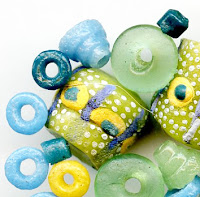For "Not Coming to America," scroll down....
Textile Project Update
 |
| Soul of Somanya Tote Bag Prototype |
Many people have assured me that slow but steady wins the race, and I know they're right. But it can be a little frustrating, especially when I also know that some of you who contributed to our Indiegogo campaign are eagerly awaiting our first textile products. And then there are those who want to purchase the fabrics to make fabulous creations of your own.
Well, here's what's going on. Originally, we thought we'd begin by importing some fabric yardage to get some of you started. But on closer examination of the full range of issues, and since we have limited funds to work with (does anyone have unlimited funds these days?), we ultimately had to change our approach.
Think of it this way: We can buy a 6-yard piece of fabric and sell it for, say, twice our cost (which is probably all that the market here will bear). But then no one in Ghana gets a new job. OR...we can hire a few Ghanaian youth with no marketable skills and train them to sew, and then take that same piece of fabric and have them make several, maybe even a dozen, tote bags or table runners or iPad sleeves or placemats. Now not only do some people who had very little chance of finding work at all get jobs at a living wage, but Soul of Somanya makes...well, substantially more money to recycle back into offering work to more people, who will then make more beautiful products for us to sell so that we can create even more jobs...and so on.
Well, here's what's going on. Originally, we thought we'd begin by importing some fabric yardage to get some of you started. But on closer examination of the full range of issues, and since we have limited funds to work with (does anyone have unlimited funds these days?), we ultimately had to change our approach.
Think of it this way: We can buy a 6-yard piece of fabric and sell it for, say, twice our cost (which is probably all that the market here will bear). But then no one in Ghana gets a new job. OR...we can hire a few Ghanaian youth with no marketable skills and train them to sew, and then take that same piece of fabric and have them make several, maybe even a dozen, tote bags or table runners or iPad sleeves or placemats. Now not only do some people who had very little chance of finding work at all get jobs at a living wage, but Soul of Somanya makes...well, substantially more money to recycle back into offering work to more people, who will then make more beautiful products for us to sell so that we can create even more jobs...and so on.
So we're putting our efforts right now into what will best help us to achieve that long-range goal. This is not to say that we won't eventually have the fabrics for sale by the yard as well. In fact, some day we hope to have our own staff of fabric-makers. But first things first. Baby steps.
So where is the project right now? Well, we have first drafts of a fair number of products, which SoS supporter Johanna Stange of Baltimore and I made up using less expensive, domestic fabrics. Currently, we are remaking the ones we like best using the lengths of beautiful, authentic wax prints that I brought home from my various trips to West Africa.
Once our prototypes are finalized (or as soon afterwards as funds allow), Johanna and I will be traveling to Ghana to begin training our new staff of workers. That's when the real fun will begin!
Thank you all for bearing with us during this much-slower-than-hoped-for period of diversification. We are so grateful for your patience and support.
So where is the project right now? Well, we have first drafts of a fair number of products, which SoS supporter Johanna Stange of Baltimore and I made up using less expensive, domestic fabrics. Currently, we are remaking the ones we like best using the lengths of beautiful, authentic wax prints that I brought home from my various trips to West Africa.
Once our prototypes are finalized (or as soon afterwards as funds allow), Johanna and I will be traveling to Ghana to begin training our new staff of workers. That's when the real fun will begin!
Thank you all for bearing with us during this much-slower-than-hoped-for period of diversification. We are so grateful for your patience and support.










